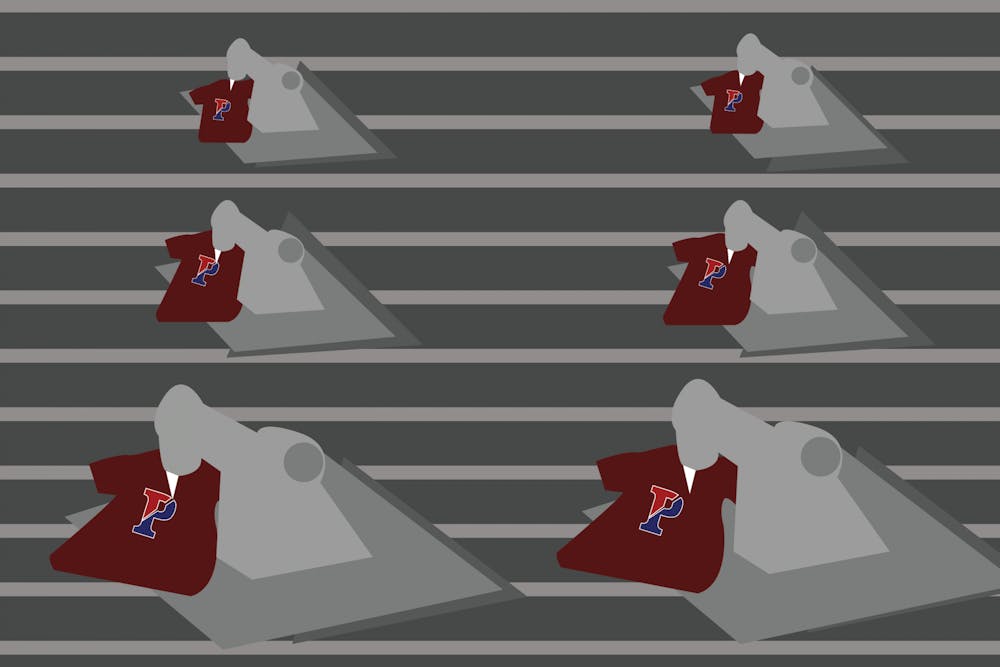
A clothing vendor with which Penn licenses is alleged to have a connection to a company using forced labor in a Chinese factory, according to a November report from a faculty group that cites the research of a prominent labor rights organization.
University officials said they are aware of the reports of forced labor and are waiting for the results of a full investigation to find out the details of the alleged violations.
Members of the Committee on Manufacturer Responsibility, a Penn group that votes each year on whether to renew or suspend the University's licenses with companies, will decide the future of Penn’s license with the factory this spring. No action has been taken by the University since the Nov. 13 CMR meeting, according to Undergraduate Assembly representatives and College sophomores Joan Dartey and Sai Mamidala, who have external seats on the Committee.
Penn’s Code of Workplace Conduct for Penn Licensed Product Manufacturers states that “Licensees and their subcontractors shall not use any forced labor, whether in the form of prison labor, indentured labor, bonded labor or otherwise.”
The CMR was made aware of the use of forced labor by the Workers’ Rights Consortium, a labor monitoring organization that tracks violations of workers’ personal rights. Penn is a member of the WRC, which helps 153 colleges and universities make decisions about contracting with companies and factories.
“We are aware of the recent WRC reports outlining evidence of forced labor, which is explicitly prohibited by our Code,” Associate Vice President for Business Services and CMR member Christopher Bradie wrote in an emailed statement to The Daily Pennsylvanian. “We are in the process of actively working with both the WRC and our licensing agency to gain specific details relative to Penn’s licensees and any instances of violations of our agreements.”
Bradie added that if the company, which was not named, is found to be in violation of Penn’s Code of Workplace Conduct for Penn Licensed Product Manufacturers, the CMR will issue the company a notice stating that it must correct the issue or face immediate termination of the contract with Penn.
“We are aware of the report and working with agencies and partners to determine if there has been a violation of our license agreement, which prohibits the use of forced labor,” University spokesperson Stephen MacCarthy wrote in an emailed statement to the DP. “Our understanding is the WRC's investigation is ongoing.”
The CMR was created in 2000 after a group of students from United Students Against Sweatshops staged a sit-in outside then-President Judith Rodin’s office, demanding that the University enact explicit language about fair labor practices for the companies it contracts from.
Mamidala, who co-wrote a report on the issue to the UA with Dartey, said that while she hopes Penn will sever its contract with the factory using forced labor, she saw the CMR’s treatment and lack of immediate action on the issue troubling. She added that she thinks the University is trying to save face by saying they are addressing the issue without taking action.
Dartey, however, is hopeful that the CMR will vote to sever the contract with the factory if the WRC confirms that forced labor is taking place.
“I'm going to wait to see what WRC recommends as an actionable item in the spring, and how Penn is going to go about it,” Dartey said. “I think what's important is if [the CMR] decides to renew or suspend the license, and if they renew it, I’d just like to know the reasoning behind it.”
College senior and UA representative Kristen Ukeomah, who found out about the issue at a UA meeting on Sunday after Mamidala and Dartey presented their report, said she was disgusted, but not surprised.
“I'm seeing the ways they shortchange or, in this case, literally, steal labor and force labor out of workers internationally,” Ukeomah said.
Ukeomah and Dartey said that the UA is looking at ways to pressure the University to both end this contract and be more transparent about the companies they license in the future.
Dartey said that, according to the CMR at the November meeting, the company producing golf apparel is the only one currently being investigated after evidence of forced labor. Ukeomah said she wants more transparency from the University to the student body about the companies it contracts with, as she believes other companies may either be using forced labor or have sweatshop conditions.
She added that if Mamidala and Dartey had not been at the CMR meeting, the student body would have had no way of knowing about this at all.
“I definitely would love to see where else Penn is exploiting labor, and then take a more concerted effort to knock it all out,” Ukeomah said.
Ukeomah said that although the UA session has ended for the semester, members are brainstorming ways to pressure Penn to end its contract with the company and provide more transparency.
Correction: A previous version of this article stated that Penn purchased its golf apparel from a company that uses forced labor, according to an Undergraduate Assembly report. Associate Vice President for Business Services Christopher Bradie did not deny allegations of the golf apparel production in an email to the DP on Dec. 8, at the time of publication. However, on Jan. 19, Penn Business Services Director of Communications and External Relations Barbara Lea-Kruger wrote that no golf apparel or any other Penn-branded apparel was produced by this licensee. UA representatives have since confirmed with the DP that their report was inaccurate, and that Penn-branded apparel was not produced by forced labor. The DP regrets this error.
The Daily Pennsylvanian is an independent, student-run newspaper. Please consider making a donation to support the coverage that shapes the University. Your generosity ensures a future of strong journalism at Penn.
Donate






